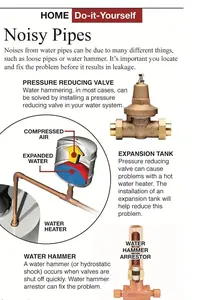 Free Download How To Stop Noisy Pipe by Noel Yarngo
Free Download How To Stop Noisy Pipe by Noel Yarngo
English | August 3, 2024 | ISBN: N/A | ASIN: B0DC5PZKNY | 158 pages | EPUB | 10 Mb
By plugging in the given factors on the previous page, the formula shows us that the pressure rise in metal pipe due to a sudden change in velocity is approximately 60 times the original flow velocity in feet per second. Thus, a common 1/2" supply line, flowing at 6 fps, can generate a pressure rise of 360 psig above and beyond the flow pressure itself (right). The resultant shock wave bounces back and forth within the supply line until it reaches a point of relief in a larger main where the initial velocity was much slower. Within plastic pipe systems, such as PVC, CPVC, and PEX, the modulus of elasticity is much less than copper or steel pipe, and thus the velocity of the pressure wave is slower. This results in a lower pressure rise in plastic pipe versus metal pipe, given the same parameters. However, an equal amount of kinetic energy exists in both plastic and metal systems. So where does the energy go if it does not result in the same type of pressure rise? The answer is the excessive energy is absorbed into the plastic piping system by the instantaneous expansion of the pipe, fittings and appurtenances within the system. Historically, water hammer damage to the pipe itself is not the main concern, because the pipe can generally handle these expansions and contractions. Rather, it is the wide variety of fitting systems for plastic pipe (i.e., solvent weld, mechanical crimp, pinch clamps, expansion fittings, both made from brass and hard plastic) that are at risk. Why Air Chambers Don’t Work It used to be thought that an air chamber, or capped stand pipe, was an effective solution to controlling water hammer. However, within an air chamber, nothing separates the air from the water. It only takes a few short weeks before the air is absorbed into the water, leaving the air chamber waterlogged and completely ineffective. Laboratory tests confirm that the air is depleted by simple air permeation and by interaction between static pressure and flow pressure. In the diagram shown, (right) notice the difference in water level between "Static Line Pressure" and "Post-cycle Static Level."
(more…)










